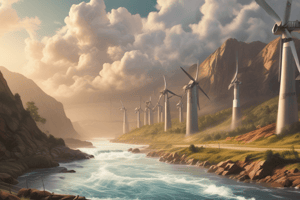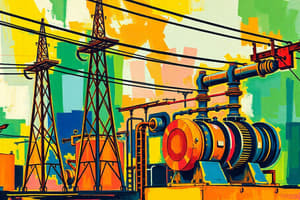Podcast
Questions and Answers
What happens when the balance of atoms is disturbed?
What happens when the balance of atoms is disturbed?
- Protons become negatively charged
- Neutrons gain a positive charge
- Atoms stop releasing energy
- Electrons start moving around freely (correct)
What is the main cause of the generation of electricity?
What is the main cause of the generation of electricity?
- Moving protons in wires
- Chemical reactions in wires
- Neutrons without any charge
- Atoms releasing energy from their nucleus (correct)
Which process involves converting other forms of energy into electrical energy?
Which process involves converting other forms of energy into electrical energy?
- Wind turbine operation
- Nuclear fission (correct)
- Hydrogen combustion
- Geothermal heat exchange
What causes power outages?
What causes power outages?
Which natural phenomenon can be used to drive turbines for electric power generation?
Which natural phenomenon can be used to drive turbines for electric power generation?
During a power outage, what must utilities do?
During a power outage, what must utilities do?
Flashcards are hidden until you start studying
Study Notes
Electricity
Electricity is a form of energy that can be used to power our homes and businesses. It's generated when atoms release energy from their nucleus. This process releases electrons which flow through wires creating electricity. Here we explore how it works, where it comes from, and what happens during power outages.
How Does Electricity Work?
Atoms contain protons with positive charges and neutrons without any charge. Electrons have negative charges. In most elements, these particles exist together in a stable arrangement called 'orbit'. When this balance is disturbed due to chemical reactions or heat, electrons start moving around more freely. They flow through wires creating electricity.
Where does Electricity Come From?
Most types of electric power generation involve converting other forms of energy into electrical energy by using either mechanical generators driven by steam turbines powered by burning fossil fuels like coal or natural gas, nuclear reactors (using the heat produced by nuclear fission), hydroelectric plants (which use falling water to drive turbines) or renewable sources such as wind, solar panels, and geothermal heat exchangers.
Power Outages and Restoration Processes
Power outages occur if there's damage to equipment like transformers, poles, lines, etc., causing a disruption in service. During an outage, utilities must restore power quickly and safely according to predetermined procedures. These steps may vary depending on factors such as cause, location, weather conditions, complexity, and number of customers affected.
In conclusion, understanding how electricity works provides insights into its production methods and restoration processes after outages. By learning about its fundamental principles, you gain valuable knowledge needed for practical applications across various fields.
Studying That Suits You
Use AI to generate personalized quizzes and flashcards to suit your learning preferences.





